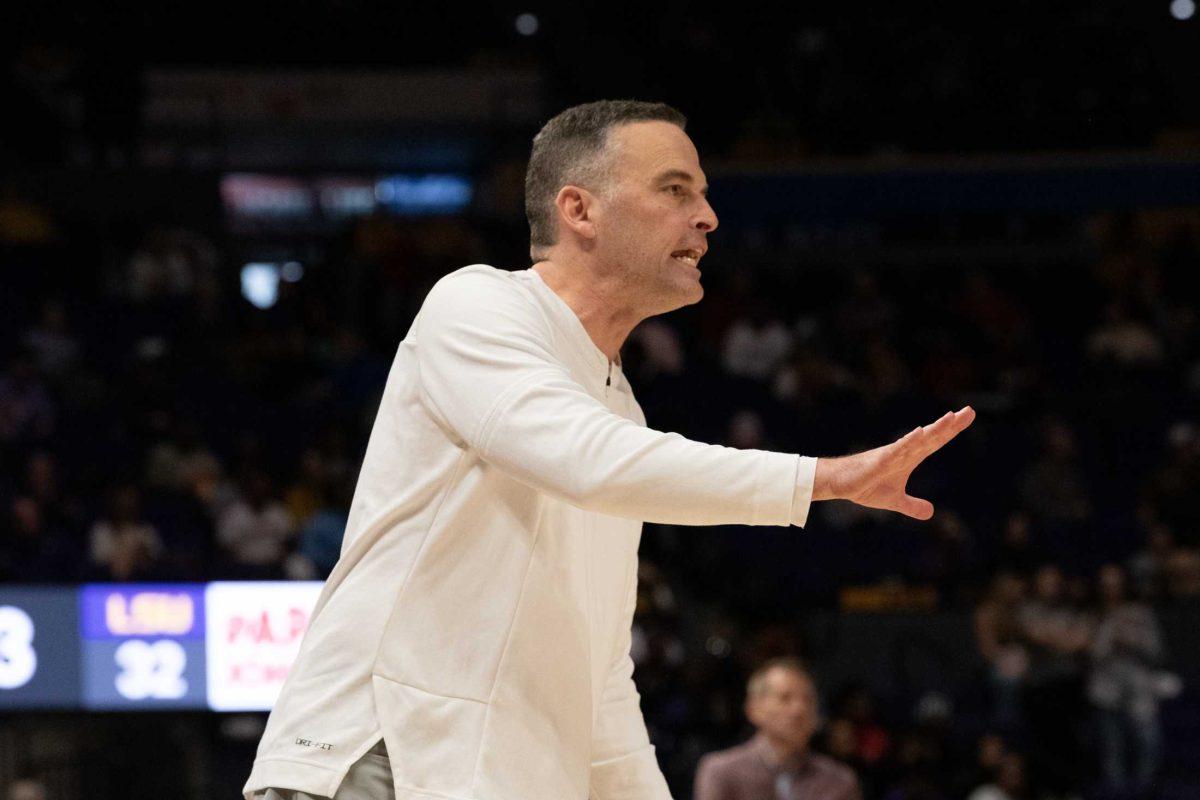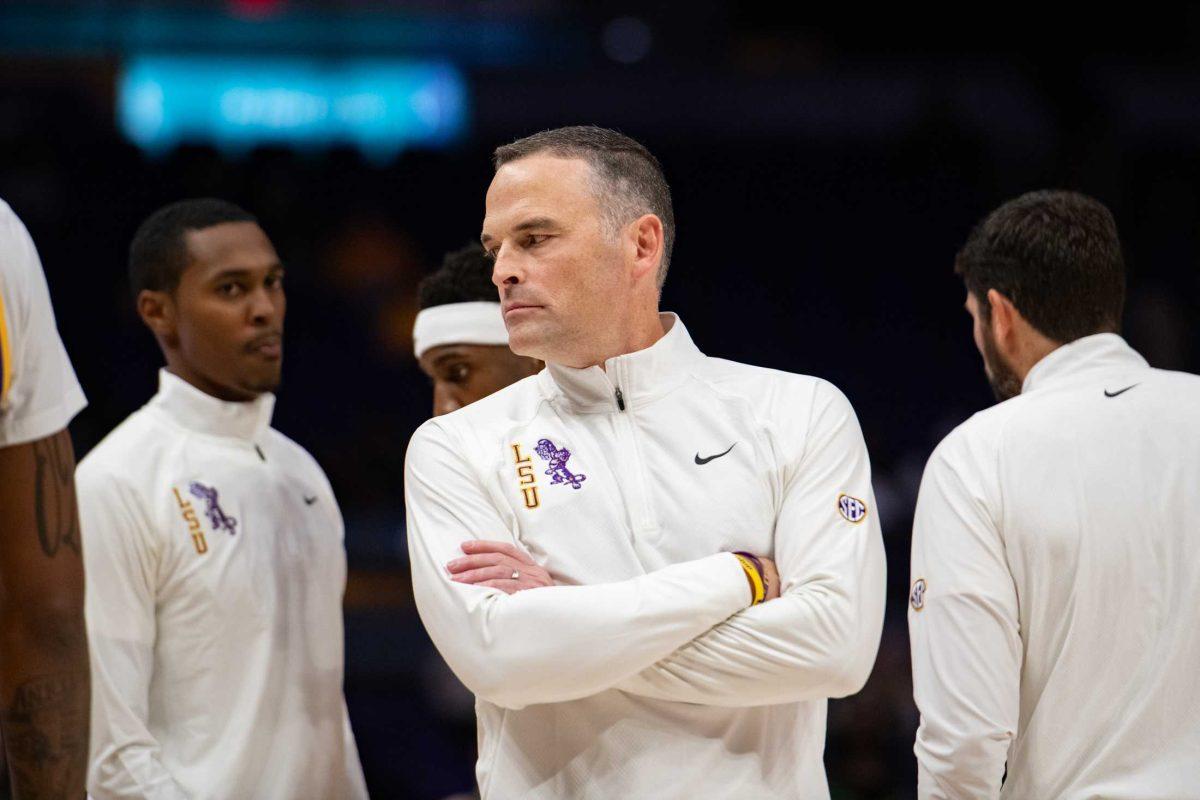LSU athletic director Scott Woodward has made a lot of big moves since the start of 2021, replacing head coaches in women’s basketball, baseball, football and men’s basketball within a span of a year.
So far, most of those changes have paid off in a big way.
Kim Mulkey quickly turned a women’s basketball program that hadn’t made the NCAA Tournament in three seasons into a championship contender.
Jay Johnson grabbed the torch from legendary baseball coach Paul Mainieri, and he currently headlines the No. 1 team in college baseball.
In his first season, Brian Kelly took a football team that bordered on bowl ineligibility in its prior two seasons and turned it into one that was two wins away from a spot in the College Football Playoff.
While there’s still time for each move to cascade, the expectations in all three programs are currently higher than ever.
But in completing the superfecta and reinvigorating four of LSU’s biggest sports programs, one pillar appears to be falling short, eroding an all-but-perfect foundation assembled by Woodward. That is the men’s basketball program under head coach Matt McMahon.
Lead-up to disappointment
Now, none of the head coaches listed before McMahon had perfect first seasons.
Mulkey’s squad was upset in its SEC quarterfinal matchup against Kentucky and its Round of 32 matchup against Ohio State, concluding an impressive season in disappointing fashion. Johnson suffered similar postseason woes and fell two runs short of a super-regional. Kelly went from a Sugar Bowl projection to falling short of a BCS bowl, with the worst of its collapse coming in a two-score loss to 5-7 Texas A&M.
Those three outcomes were disappointing but discounting them would be ignoring the obvious.
Each coach not only showed flashes of potential but also beat out their preseason projections. LSU baseball finished one spot ahead of most SEC West projections, and women’s basketball finished ahead of Tennessee, when predictions stated otherwise.
Those examples of surpassing expectations may be minor at face value, but there are multiple considerations that make them more impressive.
For one, the SEC turned out to be the deepest conference in baseball, and LSU managed to place third in the West, ahead of College World Series representatives Auburn and Ole Miss. And, because she had already won three championships during her time with Baylor, expectations for Mulkey were already tremendously high.
With two coaches already exceeding decent-to-high expectations, imagine the ecstasy of the LSU fanbase when LSU football earned the SEC West crown after it was projected to finish at-or-near the bottom.
Directly corresponding with that was the supposed rise of LSU men’s basketball, which attained a top 10 win just a few days before Kelly secured his 10th win in the Citrus Bowl. Nobody knew that the end of 2022 would cap off LSU sports’ most recent and balanced pinnacle.
Transition to Anguish
After an ugly end to the Will Wade era of LSU men’s basketball, former Murray State head coach McMahon was granted the impossible task of building a respectable SEC squad from scratch, in under eight months. Hearing that, you probably wonder how we could be hard on him given the hopelessness of the description.
While patience is warranted here and comparing McMahon’s situation to the aforementioned isn’t entirely fair, there’s a scenario where that patience becomes exhausted. That comes when early promise is followed by a lack of progression—a short but accurate description of this season of LSU men’s basketball.
Following a miraculous offseason, where McMahon kept star guard Adam Miller from transferring and surrounded him with experienced transfers and promising prospects, the program sported surprising promise heading into the 2022-23 season. Preseason projections even had the Tigers scraping into the NCAA Tournament.
Come March, those projections are merely a distant memory to fans who were simply desperate to see McMahon pick up a win down the stretch.
The Tigers initially secured promising wins over Wake Forest and Arkansas, which were met with strong, flawed performances in losses to Kansas State and Kentucky. Just as the Tigers entered the bubble, as analysts projected they would, their success would fall at an alarming rate.
The result was a near-historic low in program history, where LSU came one loss short of tying its worst losing streak in history and tied its worst SEC record in 50 years at 2-16.
That record would be understandable if McMahon had, as expected, struggled to assemble a talented squad. However, his team showed clear promise, especially in later games, but things never seemed to work out in the end. LSU’s ever-growing list of flaws remained prevalent until its last loss of the regular season.
One game, the Tigers would start slow offensively, and in the next it would finish slower. They followed one of their best rebounding performances against Alabama with one of their worst against Mississippi State, and they could not defend the three through much of SEC play. LSU finished as the second worst team in the conference, ahead of only Missouri.
When the team showed progress in a tough stretch in February, it followed up by regressing in an easier one. In its final six games, four were against teams in the bottom half of the conference. The Tigers managed to win just one of them, despite having notable leads in their last two games.
While there’s still plenty of time for McMahon to turn things around, he was the only coach of the four to not meet preseason expectations, and he wasn’t particularly close. His situation warrants one more season before the verdict is truly out, but if the next season produces little-to-no improvement, Woodward’s hire will be a blow to his resume.









